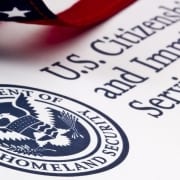The Public Charge Rule is set to go into affect on October 15th. The new policy has received many challenges, both in court and with Immigration advocates. Critics of the new rule have claimed “The new rule — which critics say makes the definition of “public charge†so vague and all-encompassing that it will effectively favor only rich, white immigrants — drew swift rebuke from dozens of state and local governments, attorneys general, public health organizations and immigrant advocacy groups after U.S. Citizenship and Immigration Services formally announced the policy in September.â€
The USCIS has refused to comment on the on-going legal battle between the courts and the Trump administration. Washington Post writer Abigale Hauslohner reports “Is expected to decide next week on whether to block the rule from taking effect.â€
Another Federal Judge in Olympia, Washington is going to hold a separate hearing on the same piece of policy. The lawsuit was filed by a coalition of 13 different states. Judges in New York, Maryland and Illinois will also be making decisions on this policy.
If the policy goes into effect, according to Hauslohner “the new public-charge rule, immigrants who are in the United States legally and use public benefits such as Medicaid, food stamps or housing assistance — or have at one time used public benefits, or are deemed likely to someday use public benefits — could be considered “public charges,†rendering them ineligible for green cards.
The new criteria provide “positive†and “negative†factors for immigration officials to weigh as they decide on green-card applications. Negative factors include whether a person is unemployed, dropped out of high school or is not fluent in English.†Hauslohner also reports “Critics say the rule is likely to reduce legal immigration by slashing eligibility for family-based visas, the leading type of legal immigration to the United States, particularly from low-income countries in Africa and Latin America. They say it could also lead to more deportations as huge numbers of immigrants see their applications denied.â€
Hauslohner states “The lawsuits argue that the new “public charge†definition deviates substantially from more than 100 years of legal interpretation. They say it will cause significant harm to the health and well-being of immigrant families, as well as the institutions that service them, by leading many to abstain from seeking public benefits that they or their children may need.â€




